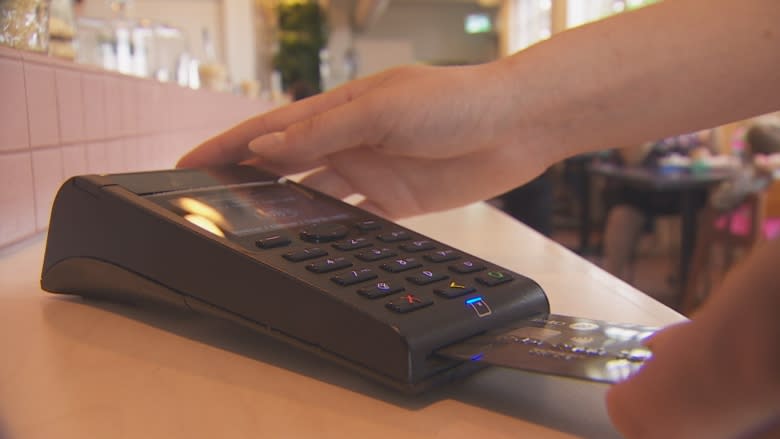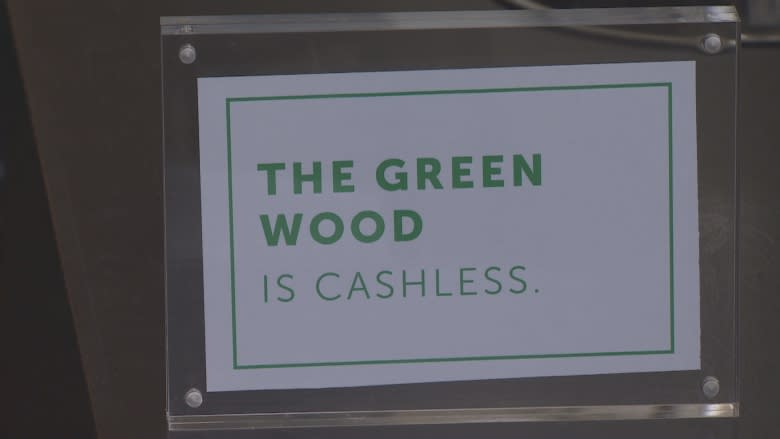Going cashless catching on in Toronto's trendy eateries
More Toronto businesses are taking the leap and no longer accepting coins and bills as fewer and fewer customers seem to be carrying cold hard cash.
The Green Wood, a popular brunch spot on Queen Street East near Greenwood Avenue, is one of them. The restaurant opened in December and decided in March to go completely cashless.
"We found that less than 10 per cent of our customers use cash and like all restaurants we spent a lot of time working the cash register," one of the Green Wood's managers, Tory Ferguson, told CBC Toronto.
She says the time associated with starting the day, opening up the cash register, making sure there were enough small bills to make change, checking and counting and recounting during the day, and finally going to the bank to make deposits at the end of the day, just wasn't worth it.
"It really expedites things for the staff," Ferguson said. "And sometimes mistakes happen, so we just decided to take all that human error out. and all the time it takes to count it on a daily basis. Everything is above board and precise and there's no room for error."
The restaurant has a sign near entrance to inform customers that while it is legal tender, cash will not be accepted.
"We've heard a lot of surprise, but a lot of people do like it. There are some who are set in their ways and like to stick to cash," Ferguson said. "I explain to them that it's going to be the way of the future."
When customer Janice Yeo arrived at The Green Wood with eight-week-old Kate she didn't know about the no-cash policy.
"I just saw the sign when I came in," said Yeo, who added it wasn't a problem because she never carries cash anyway. "You just want go out of the house really fast and there's enough things to pack in the diaper bag already. The less things the better."
The Green Wood will accept debit cards, credit cards, even Apple Pay. The only electronic currency not accepted is Bitcoin.
Ferguson says the transaction fees haven't made a huge difference to the bottom line, and having no cash change hands has simplified operations.
Malcolm Fowler, chief product and partnership officer with Moneris — the largest processor of debit and credit transactions in Canada — says going cashless is not only the way of the future, it's also becoming a great way for businesses to save money.
"Banks charge a fee for accepting cash," Fowler said. He says some of the larger merchants have crunched the numbers and say while the costs of electronic payments have gone down, the costs of cash acceptance are going up partially because fewer people are using it.
"Many retailers are starting to make comparisons that suggest that electronic payments are actually cheaper than the cost of accepting cash."
Fowler disputes the claim that going cashless is adding to consumer debt as people put everything on their credit cards.
"Cashless is not always about debt, it's about convenience," he told CBC Toronto. "We've watched the ratio of credit and debit payments — those which come directly out of a bank account. And we haven't seen a big change in the ratios of those payments."
Moneris predicts that by 2030, 90 per cent of their business transactions will be electronic as people get more and more used to going cashless for all their daily transactions.
For getting around they have Prestocard for boarding GO Trains or the TTC. If they are driving, the Toronto Parking Authority has an app that's been downloaded more than a million times that makes paying with coins obsolete.
And Uber car transportation and food delivery mobile apps mean cash never has to change hands.
Back at the Green Wood, Ferguson says cash has all but disappeared, with one exception.
"Tips are doled out twice a week. So I do go to the bank and take it out and distribute that to the staff," she said. "They get paid in cash, absolutely."




